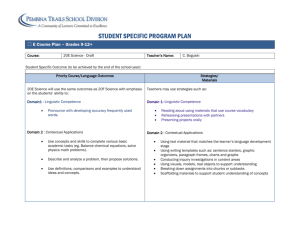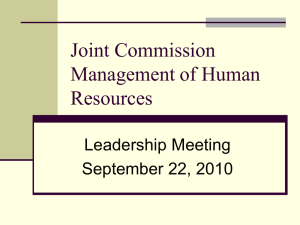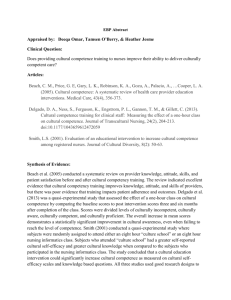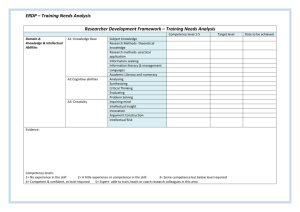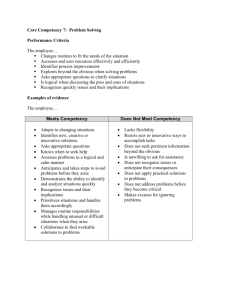Cultural Competence Strategy
advertisement
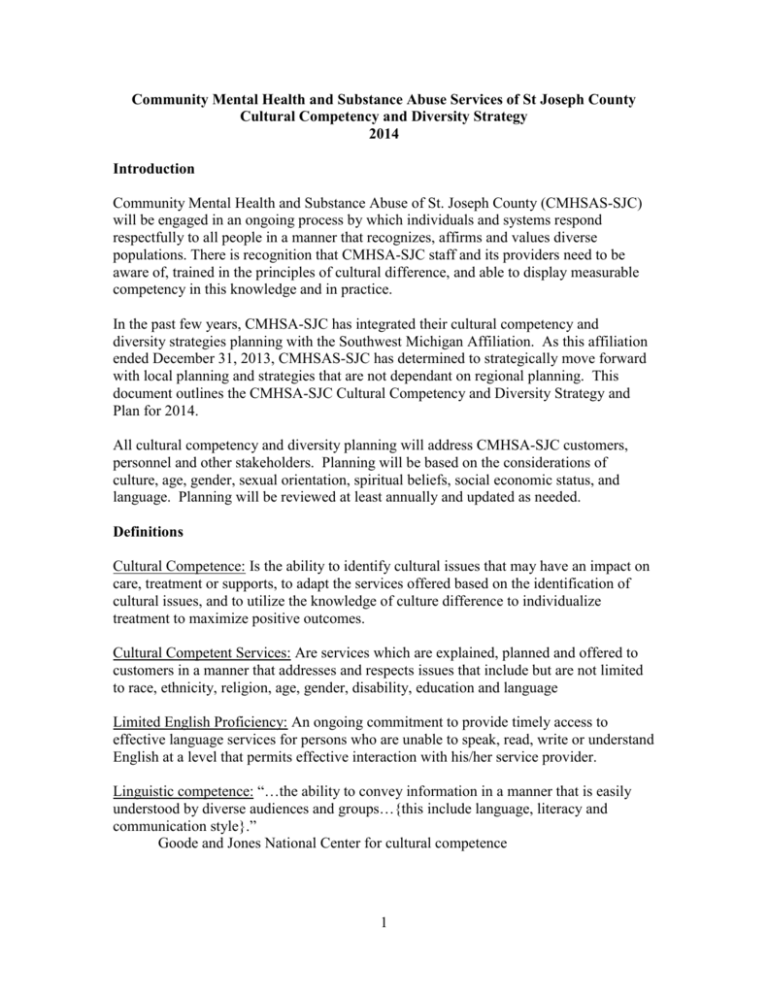
Community Mental Health and Substance Abuse Services of St Joseph County
Cultural Competency and Diversity Strategy
2014
Introduction
Community Mental Health and Substance Abuse of St. Joseph County (CMHSAS-SJC)
will be engaged in an ongoing process by which individuals and systems respond
respectfully to all people in a manner that recognizes, affirms and values diverse
populations. There is recognition that CMHSA-SJC staff and its providers need to be
aware of, trained in the principles of cultural difference, and able to display measurable
competency in this knowledge and in practice.
In the past few years, CMHSA-SJC has integrated their cultural competency and
diversity strategies planning with the Southwest Michigan Affiliation. As this affiliation
ended December 31, 2013, CMHSAS-SJC has determined to strategically move forward
with local planning and strategies that are not dependant on regional planning. This
document outlines the CMHSA-SJC Cultural Competency and Diversity Strategy and
Plan for 2014.
All cultural competency and diversity planning will address CMHSA-SJC customers,
personnel and other stakeholders. Planning will be based on the considerations of
culture, age, gender, sexual orientation, spiritual beliefs, social economic status, and
language. Planning will be reviewed at least annually and updated as needed.
Definitions
Cultural Competence: Is the ability to identify cultural issues that may have an impact on
care, treatment or supports, to adapt the services offered based on the identification of
cultural issues, and to utilize the knowledge of culture difference to individualize
treatment to maximize positive outcomes.
Cultural Competent Services: Are services which are explained, planned and offered to
customers in a manner that addresses and respects issues that include but are not limited
to race, ethnicity, religion, age, gender, disability, education and language
Limited English Proficiency: An ongoing commitment to provide timely access to
effective language services for persons who are unable to speak, read, write or understand
English at a level that permits effective interaction with his/her service provider.
Linguistic competence: “…the ability to convey information in a manner that is easily
understood by diverse audiences and groups…{this include language, literacy and
communication style}.”
Goode and Jones National Center for cultural competence
1
Strategies
Community Mental health and Substance Abuse of St. Joseph County will be engaged in
an ongoing process by which individuals and systems respond respectfully to all people
in a manner that recognizes, affirms and values diverse populations.
There is recognition that CMHSA-SJC staff and its providers need to be aware of, trained
in the principles of cultural difference, and able to display measurable competency in this
knowledge and in practice.
Goals:
1. Recruit applicants who will enhance the cultural diversity of employees and who
demonstrate the commitment of providing culturally competent services.
2. Ensure that staff are adequately trained in Limited English Proficiency and
Cultural Competency for adequately preparing them to meet the cultural and
diversity needs of the community and population served.
3. All services will be provided in a culturally competent atmosphere and will
demonstrate acceptance for the individuals’ cultural values, beliefs, age, gender,
sexual orientation, social economic status, and language, as well as the ability to
apply the understanding in delivering cultural competent and linguistic services to
each customer.
Action Steps:
1. Add bilingual preference to all the advertisement for future employees. (April
2014)
2. Incorporate into job descriptions specific expectations in regards to the
competency standards. (March 2014)
3. Add recovery language to all job descriptions. (March 2014)
4. The HR department will monitor that cultural competency is consistently a part of
the hiring process for prospective candidates for employment. (Ongoing
5. Add a welcoming greeting in Spanish. (July 2015)
6. Develop and implement a local Cultural Competence and Diversity Committee.
(July 2014)
7. Cultural diversity and LEP training will be part of the orientation of new staff
with annual updates. Additionally, management staff shall mentor, evaluate and
monitor cultural diversity/competence and requires staff training when
appropriate. (Ongoing)
8. Review annual census data whether any significant changes in demographics have
occurred and update cultural competency and diversity plan accordingly.
(Ongoing)
9. CMHSA-SJC will seek to have a diverse provider network panel to meet the
needs of its customers. (Ongoing)
2
Policy on LEP and Cultural Competence
CMHSA-SJC will establish and maintain policies and procedures to ensure access to
services that provide a culturally competent atmosphere and that allows for meaningful
participation by individuals receiving services. It is expected that all persons served,
including those experiencing co-occurring mental health and substance abuse use
disorders will be treated in a timely, respectful and welcoming manner. Further, we will
promote an unconditional Culture of Gentleness, natural supports, a trauma informed
system of care and pathways to recovery to further improve outcomes for persons
serviced.
CMHSA-SJC has two current policies directly related to LEP and cultural competency.
Policy 06.02 addresses Cultural & Linguistic Competency and policy 06.03 addresses on
LEP. These policies will be reviewed annually and updated as needed.
Resources:
The Society of Human Resource Management – www.shrm.org
National Center for Cultural Competence – ncc.georgetown.edu
U.S. Department of Health and Human Services –
www.hrsa.gov/culturalcompetence/index.html
Office of Minority Health, U.S. Department of Health and Human Services –
www.thinkculturalhealth.hhs.gov
References:
MDCH and CMHSJC agreement for Medicaid Specialty Supports
Managed Mental Health Supports Services Contract between DCH and
CMHSAS-SJC
Medicaid Chapters 111
CARF Standards on Cultural Competency and Diversity Planning
3
CMHSAS-SJC Board
For Board discussion on Cultural Competence
It shall be the policy of Community Mental Health and Substance Abuse Services of St.
Joseph County that services shall reflect an ongoing commitment to accommodate
cultural and linguistic diversity in order to ensure access and meaningful participation for
all people in St Joseph County.
Why be culturally and linguistically competent?
Increasing diversity of U.S population
Of 307 million >35% are people of color (2010) and increasing fast
Latino/Hispanics are >15%, by 2050 will be >30% of total population
Projected rate of increase of Asian youth:74% between 19956-2015
Projected rate of increase of Latino youth 59% between 1995-2010
CMHSJC shall attempt to hire and retain employees that are representative of the
community make up including: ethnicity, race, religion, age, gender, prevalent language
within the service area, and regions of customers served (rural backgrounds). We will
adhere to EEO standards and have accommodations for employees. Advertising will be
done both locally as well as in major metropolitan areas to elicit a variety of applicants.
The Board of Directors who is appointed by the County of Commissioners should have
consideration given to ethnicity as represented in the service area and area of residence in
the community to insure all areas are represented. The Board representation most reflect
state mandated number of primary consumers and family of primary consumers. The
Board members should be representative of varied business, social, religious aspects of
the community.
Board Motion
We will remain relevant to our ever changing societal diversity to address behavioral
health disparities by increasing access, availability, utilization, quality and outcomes for
underserved, un-served and poorly served diverse populations and to provide services and
supports that are culturally appropriate and that work!
4


